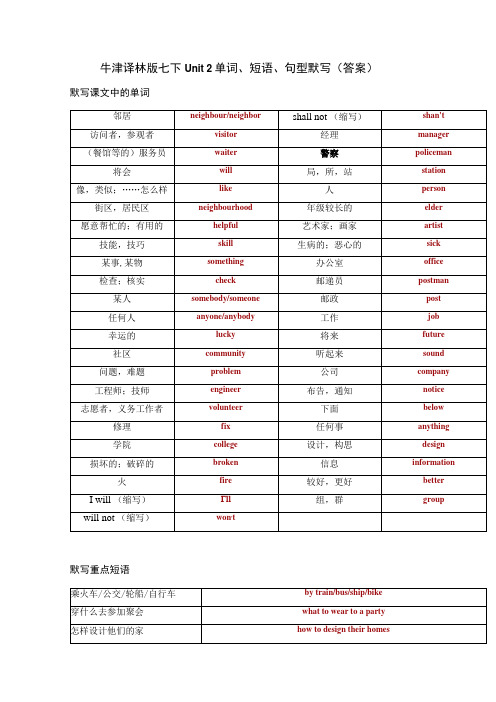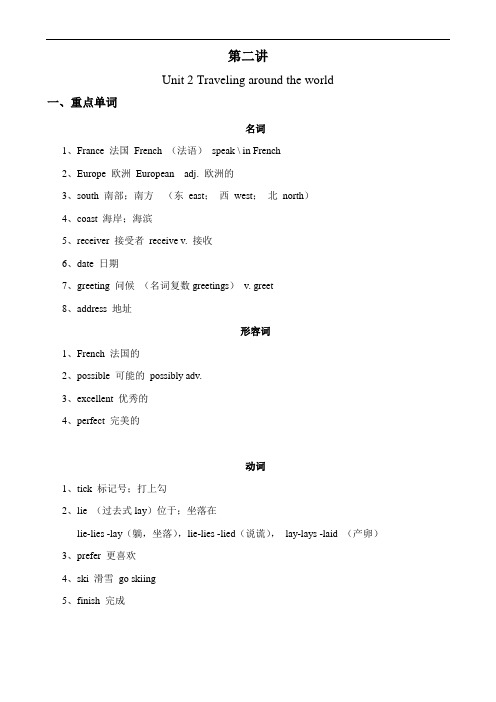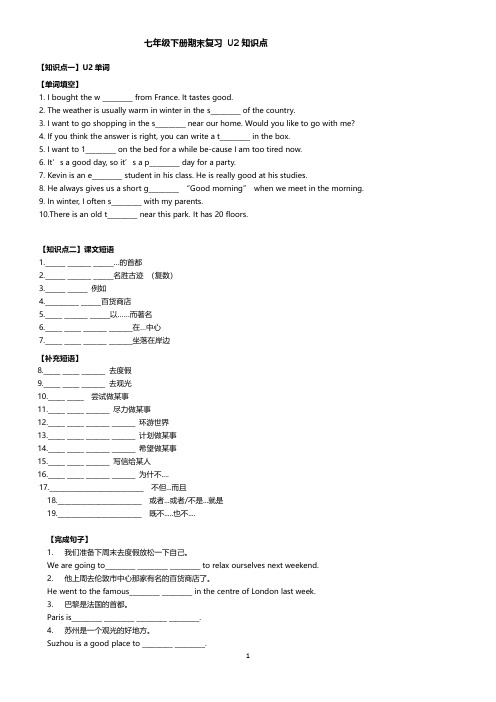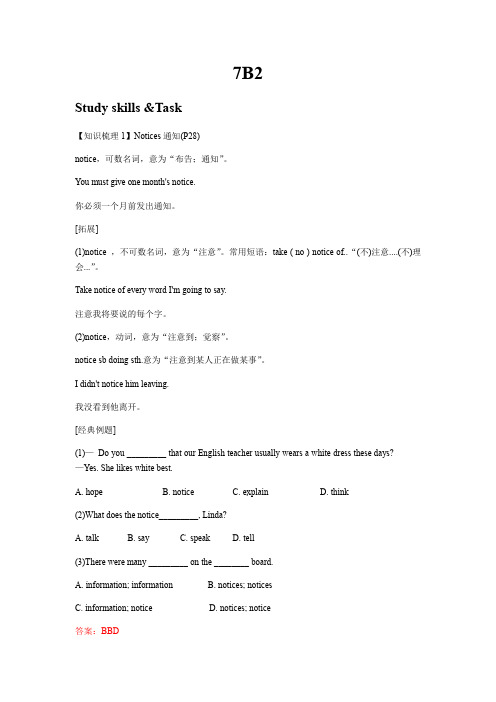七下英语U2知识点(答案版)
七年级下册译林英语U2知识点

七年级下册译林英语U2知识点Unit 2: School lifePart 1: Vocabulary1. classroom [ˈklæsruːm] n. 教室2. desk [desk] n. 课桌3. chair [tʃeə(r)] n. 椅子4. blackboard [ˈblækˌbɔːd] n. 黑板5. chalk [tʃɔːk] n. 粉笔6. textbook [ˈtekstbuːk] n. 教科书7. notebook [ˈnəʊtbʊk] n. 笔记本8. pencil [ˈpensl] n. 铅笔9. pen [pen] n. 钢笔10. schoolbag [ˈskuːlbæɡ] n. 书包Part 2: Grammar1. Present simple常用于表达经常性的事情或普遍的真理,构成为主语+动词原形。
例如:My school starts at 8 am every day.Water boils at 100 degrees Celsius.2. Present continuous表示目前正在进行的动作,构成为主语+be动词(am, is, are)+现在分词(-ing形式)。
例如:I am studying English now.They are playing basketball in the playground.3. Imperative sentence表示命令或请求,句子以动词原形开头,例如:Sit down, please.Open your books and turn to page 20.Part 3: Reading本单元的阅读主题为“校园生活”,主要介绍了校园内的一些活动和学习生活。
文章包括基本信息和详细描述,有关键词的注释和例句。
通过阅读可以更好地理解英语的表述方式和用词习惯。
Part 4: Writing本单元的写作任务为以“My school life”为题,介绍自己在学校的生活。
牛津译林版 七下 Unit 2 单词、短语、句型默写(答案)

你要去哪里?
Where are you going?
我要去拜访我们的新邻居。
Γm going to visit our new neighbours.
恐怕他们不会欢迎像你这样的拜访者。
Γm afraid they won,t welcome visitors like you.
我住在第九大街城市花园的一所公寓里。
turn on∕o∏,
一小时后
in an hour
开会
have a meeting
保持忙碌
keep busy
准备做某事/乐于做某中
be ready to do sth.
将来
in the future
打扫卫生/读些书/买东西
do some cleaning/reading/shopping
需要帮助他们解决困难
你能找人帮助你做家庭作业吗?
Can you find anyone to help you with your homework?
一些大学生准备来帮忙。
Some college students are ready to help.
他们中的一些人经常拜访老年人并且为他 们买东西。
Some of them often visit the old people and do some shopping for them.
我的电脑出毛病了。
,Γhere,s something wrong with my computer.
我将要找一个电脑工程师来检查它。
Γm going to ask a computer engineer to check it.
我表妹安妮的自行车坏了,所以她要找人修 理它。
初一下册U2讲解+习题,带答案

第二讲Unit 2 Traveling around the world一、重点单词名词1、France 法国French (法语)speak \ in French2、Europe 欧洲European adj. 欧洲的3、south 南部;南方(东east;西west;北north)4、coast 海岸;海滨5、receiver 接受者receive v. 接收6、date 日期7、greeting 问候(名词复数greetings)v. greet8、address 地址形容词1、French 法国的2、possible 可能的possibly adv.3、excellent 优秀的4、perfect 完美的动词1、tick 标记号;打上勾2、lie (过去式lay)位于;坐落在lie-lies -lay(躺,坐落),lie-lies -lied(说谎),lay-lays -laid (产卵)3、prefer 更喜欢4、ski 滑雪go skiing5、finish 完成二、重要短语1. (be) famous/ known for 以……而著名2. department store 百货商店3. prefer to do更喜欢做某事4. go on holiday 去度假5. go sightseeing 去观光6. western Europe 西欧7. the capital of …的首都8. place of interest 名胜古迹(复数)9. such as 比如10. in the center of 在…中心11. on the coast 在海岸线上,在海岸12. try doing 尝试做某事(try to do)13. be close to 接近于14. be different from 不同于15. be far away from 远离…三、重点词汇和短语讲解1. France 名词“法国”French adj. “法国的”Frenchman“法国人”,其复数形式为Frenchmen2. south n.南部,南方adj.南面的,向南的adv.向南,朝南Have you ever been to the South of France? 你去过法国南部吗?3. lie(lay,lain)v.位于,坐落于Shanghai lies at the mouth of the Yangtze River.上海位于长江的入海口。
广州英语七年级下册期末复习 U2 知识点 (附答案)

七年级下册期末复习 U2 知识点
【知识点一】U2 单词
【单词填空】 1. I bought the w _________ from France. It tastes good. 2. The weather is usually warm in winter in the s_________ of the country. 3. I want to go shopping in the s_________ near our home. Would you like to go with me? 4. If you think the answer is right, you can write a t_________ in the box. 5. I want to 1_________ on the bed for a while be-cause I am too tired now. 6. It’s a good day, so it’s a p_________ day for a party. 7. Kevin is an e_________ student in his class. He is really good at his studies. 8. He always gives us a short g_________ “Good morning” when we meet in the morning. 9. In winter, I often s_________ with my parents. 10.There is an old t_________ near this park. It has 20 floors.
七下U2知识清单

七年级下册Unit 2 I’m going to study puter science. 知识清单一、单词Section A:1.cook(v.烹饪;煮n.厨师)→cooking (n.)烹饪→cook(n.)厨师→cooker(n.)炊具;2.violinist(n.小提琴手)→.violin(n.)小提琴3.driver(n.驾驶员)→drive(v.)开车4.pianist(n.钢琴家)→piano(n.)钢琴5.Scientist(n.科学家)→science (n.) 科学6.medicine(n.)→medical(adj.)医疗的;医学的cation(n. 教育)→educational (adj.)有教育意义的8.foreign(adj.)→foreigner(n.)外国人Section B:9.meaning(n.意义:意思)→(v.)意思是;10.beginning(n.)at the beginning of→begin (v.)开始→beginner (n.)初学者11.improve(v.)→improvement (n.)提高12.agree(v.)→agreement(n.)同意→disagree(反义词)不同意agree to do sth/ agree with sb. / agree on sth13.own(adj./pron.)→own(v.)拥有→owner(n.)主人;所有者on one's own=by oneself单独,独自某人自己的one's own14.personal(adj.个人的;私人的)→person (n.人)二、重要短语和知识点Section A:1.电脑科学puter science2.电脑程序员puter programmer 公交车司机bus driver 篮球运动员basketball player3.长大grow up4.想成为want to be 想干某事want to do=would like to do =feel like doing5.上表演课take acting lessons 上声乐课take singing lessons 上游泳课take swimming lessons 拍照take photos6.练习打篮球practice playing basketball练习做某事practice doing sth.(enjoy/finish/spend/keep/stand/mind +doing)7.擅长做某事be good at +n./doing 对...有益be good for...和某人相处得好be good with sb.8.继续/坚持做某事keep on doing sth. 保持健康keep healthy9.想让我当医生want me to be a doctor (want sb. to do sth.想让某人做某事)10.对于...不确定be not sure about...11.everyone 看成单三人称,在一般现在时中其做主语时谓语动词用单三12.确保make sure13.竭尽全力try/do one’s best 竭尽全力去做某事try one’s best to do sth.14.搬去上海move to Shanghai.15.高中大学毕业finish high school and college. 完成某事finish doing sth.16.烹饪学校a cooking school17.在大学学医study medicine at a university18.明年九月next September (用于一般将来时:next week/month/year) 区分the next day (第二天,一般用于一般过去时)19.把它们寄给杂志社和报社send them to magazines and newspapers. (send sb. Sth.=send sth. to sb. 给某人寄某物)Section B:1.新年计划New Year’s resolutions2.明年next year (用于一般将来时)3.学习弹吉他learn to play the piano (learn to do sth. 学习做某事,learn from...向...学习,learn ...by oneself 自学..., play+the+乐器)4.组建足球队make the soccer team (make sb. do sth. 让某人做某事)5.取得好成绩get good grades6.吃更健康的食物eat healthier food 区分eat more healthily (吃得更健康)7.进行很多锻炼get lots of exercise (lots of=a lot of 很多+名词复数或不可数名词)8.上吉他课take guitar lessons9.再学一门外语learn another foreign language10.不适合我are not for me (be for 赞成,适合)11.sound/look/feel/taste/smell+adj. (sound like+名词)12.能做某事be able to do sth.=can do sth.13.下决心make resolutions14.决心的含义the meaning of resolution15.不同种类的决心different kinds of resolutions16.一种承诺a kind of promise17.对...许诺make promises to sb. 信守诺言keep promises18.打扫房间tidy/clean my room19.从学校回来get back from school20.年初at the beginning of the year (at the end of the year 年底)21.改善我们的生活improve our lives22.写下write down23.来年the ing year24.帮助某人做某事help sb.(to) do sth. help sb.with sth.25.告诉某人关于某事tell sb about sth. (tell sb. to do sth. 告诉某人去做某事tell stories/jokes 讲故事/笑话)26.身体健康physical health27.例如(一般加句子) for example such as后一般加词或词组28.对自己许诺promise themselves29.与...有关have to do with...30.培养一个像绘画或者拍照这样的爱好take up a hobby like painting or taking photos31.制定一周的学习计划make a weekly plan for schoolwork32.更多的学习时间more time to study (动词不定式作后置定语)33.although不和but连用,because不和so连用34.有一个共同点have one thing in mon 没有共同点have nothing in mon35.几乎从不hardly ever(表示否定)36. too+形容词原级+to+动词原形:太...而不能... He is too young to go to school. 他太小了没法上学。
Unit 2 study 知识点整理及练习牛津译林版英语七年级下册(含答案)

7B2Study skills &Task【知识梳理1】Notices通知(P28)notice,可数名词,意为“布告;通知”。
You must give one month's notice.你必须一个月前发出通知。
[拓展](1)notice ,不可数名词,意为“注意”。
常用短语:take ( no ) notice of..“(不)注意....(不)理会...”。
Take notice of every word I'm going to say.注意我将要说的每个字。
(2)notice,动词,意为“注意到;觉察”。
notice sb doing sth.意为“注意到某人正在做某事”。
I didn't notice him leaving.我没看到他离开。
[经典例题](1)—Do you _________ that our English teacher usually wears a white dress these days? —Yes. She likes white best.A. hopeB. noticeC. explainD. think(2)What does the notice_________, Linda?A. talkB. sayC. speakD. tell(3)There were many _________ on the ________ board.A. information; informationB. notices; noticesC. information; noticeD. notices; notice答案:BBD【知识梳理2】Please look at the information below.(P28)请看下面的信息。
rmation,不可数名词,意为“信息”。
I found this information on their website.我在他们的网站上发现了这一信息。
英语七下unit2知识点总结归纳
七下unit2知识点总结一、重要词组1、live in a flat in City Garden in Ninth street 住在第九街道城市花园的公寓里2、most students=most of the students 大多数学生3、have/hold a meeting 开会4、do some shopping for them 为他们购物do some washing/reading/cleaning5、plan a day out with my uncle`s family 计划和叔叔一家外出一天6、the day after tomorrow 后天7、make a fire 生火8、work in a restaurant in the town centre 在镇中心一家餐馆工作9、her elder brother 她的哥哥10、go to work by train. 乘火车上班by +交通工具11、at the community centre 在社区中心12、on the afternoon of 5 March 在三月五号的下午on Monday afternoon/morning13.worry about what to wear to a party 担心穿什么去晚会14、all the day= the whole day=all day long 一整天15、know a lot about styles and colours 关于风格和颜色知道很多16、be happy to give you some ideas 很高兴给你一些主意17、worry about= be worried about 担心……二、重要句子1. People here are like a big family. (like 为介词,像)这儿的人像一个大家庭。
2. What are you going to be in the future? 将来你想成为什么?3.He often goes to work by bike=He often rides to work. 骑车上班4.I`m sure you`ll be good at it. be sure +从句5.We are going to have a “ helping hands” meeting at the community centre on the afternoon of 5 March.6.Is there anything wrong with your fridge? 疑问句和否定句中something 改为anything7.They will be happy to give you some ideas. 他们将很高兴给你一些想法。
七年级下英语unit2知识点归纳
七年级下英语unit2知识点归纳Unit2是一学期英语课程中重要的一部分,本单元主要介绍了一些基础的英语语法和词汇。
下面我们来对Unit2的知识点做个简单的归纳。
一、情态动词情态动词是英语语法中很重要的一部分,它们可以用于表达某种根据语境而定的情态语气。
在Unit2中,我们学习了“can”和“must”这两种情态动词。
它们分别表示能力和必须做的事情。
例如:1. I can swim.(我会游泳。
)2. We must do our homework now.(我们现在必须做我们的作业了。
)二、短语动词短语动词是由一个动词和一个或多个介词、副词、副动词等组成的短语,它们的意思与单独使用该动词时有所不同。
在Unit2中,我们学习了“look after”和“come back”这两个短语动词。
例如:1. Who will look after the dogs when we are away?(我们离开时,谁会照看这些狗?)2. Jack will come back at 5 o'clock.(杰克将在5点钟回来。
)三、反意疑问句反意疑问句是由一个陈述句和一个短语构成,用于表达询问或确认。
通常反意疑问句的意思与其所在的陈述句产生反义关系。
在Unit2中,我们学习了如何构建反意疑问句。
例如:1. You don't like coffee, do you?(你不喜欢咖啡,是吗?)2. Your father is a doctor, isn't he?(你的父亲是医生,对吗?)四、一般过去时态一般过去时态是用于表达已经发生的动作或事件的时间。
在Unit2中,我们学习了如何构建一般过去时态。
例如:1. I studied English last night.(我昨晚学习了英语。
)2. They visited Shanghai last year.(他们去年访问了上海。
)五、名词名词是用于表示某种事物、人或想象的概念的词语。
北师大版七年级下册英语unit2知识点语法点(含答案)
学问图谱Unit 2 On the Weekend学问精讲一、必背词汇violin n. 小提琴chore n. 家务活;琐事clean v. 清扫adj. 干净的,干净的dust v. 擦去……的灰尘n. 灰尘feed v. 给〔人或动物〕食物;喂养;饲养sweep v. 扫;清扫floor n. 地板;地面;楼层rubbish n. 垃圾;废弃物water v. 给……浇水n. 水busy adj. 忙的,杂乱的 vt. 使忙于 vi. 忙cup n. 杯子;一杯anything prop. 任何事物;任何东西worry v. 担忧;担忧ring v. 响起铃声;给……打n. 戒指knock v. 撞;敲n. 敲击;敲门声candlen. 蜡烛wonderful adj. 精彩的;使人开心的dish n. 碟;盘;餐具;一道菜nose n. 鼻子, 突出局部, 嗅觉 v. 嗅communication n. 沟通;交际tool n. 工具 vt. 驾驶,用工具加工,印压图案于 vi. 驾驶, 用工具加工instant adj. 马上的message n. 信息,消息text n. 文本;文章 v. 发短信send v. 发送receive v. 接到;收到while n. 一会儿 conj. 在……期间slow adj. 慢的 adv. 渐渐地 vt.& vi. 放慢,减速just adv. 只是;正好;刚刚website n. 网站bankn. 银行;河岸museum n. 博物馆police n. 警察部门;警方station n. 站,所,局;火车站;电视台post n. 邮政;职位 v. 邮寄;张贴;公布office n. 办公室,职务,事务train n. 火车underground n. 地铁way n. 路线;路;方法excuse v. 原谅n. 借口;理由cross v. 穿越,越过,横过street n. 大街;街道road n. 路,道路,大路corner n. 角;街角miss v. 错过;惦念opposite prep. 与……相对 adj. 对面的;across prep. 从一边到另一边;横过square n. 广场gym n. 体育馆;健身房二、重点词汇1.busy adjective /ˈbɪzi/If you are busy, you are working hard, or giving your attention to a particular thing.劳碌的;忙于……的;专注的1).Mum was busy in the kitchen.妈妈在厨房里忙活呢。
人教初中英语7年级下册Unit2知识清单及习题含答案
Unit2 Whattimedoyougotoschool?一、必记单词dressv穿衣服n连衣裙nightn.晚上;夜晚walkn.&v.行走;步行brushv.刷;刷净n.刷子funnyadj奇怪的;滑稽好笑的quicklyadv.很快地toothn.牙齿exercisev&n锻炼;练习eitherconj或者adv也usuallyadv通常地;一般地bestadj最好的adv最好地;最sometimesadv有时fortynum.四十groupn.组;群tastev有的味道;品尝n.味道;neveradv从不;绝不halfn.&pron,一半;半数滋味earlyadv.&adj早〔的〕quartern.一刻钟;四分之一lifen.生活;生命workv&n.工作runv跑;奔stationn,电〔视〕台;车站cleanv清扫;弄干净adj干净的词汇拓展up〔反义词)downwork(同义词〕job eitheror〔反义词〕neitherbrush〔单三〕brushesnight(反义词〕day nortooth〔复数〕teethhalf(复数〕halves life(复数〕livesalways(反义词)never run〔现在分词〕running taste〔单三〕tastes early(反义词〕late clean(现在分词〕cleaning二、重点短语getup起床;站起halfpast+钟点数点半getdressed穿上衣服gohome回家have/takeashower洗淋浴eatquickly吃得快onweekends〔在〕周末playsports做运动do〔one’s〕homework做作业havemuchtimefor有许多时间做takeawalk散步;走一走forhalfanhou半小时rlotsof=many+可数〔复数〕大量,许多gethome到家either...or要么要么;或者或者eatagoodbreakfast早餐吃得好,好好吃一顿早餐brushteeth刷牙eatforlunch午餐吃have(eat)breakfast/d inner 吃早餐/晚餐afterlunch/dinner午餐/晚餐后Whattime几点,何时be(not)goodfor对健康有〔没〕益gotoschool去学校tastegood尝起来好吃atnight在晚上haveaveryhealthylife有健康的生活fromto从到needtodo需要做inthemorning/afternoon/evening在上午/下午/晚上afterdoingtohave为了有做后gotowork去上班fromMondaytoFriday从周一到周五That'safunnytimefor那是做有意思的时间。
- 1、下载文档前请自行甄别文档内容的完整性,平台不提供额外的编辑、内容补充、找答案等附加服务。
- 2、"仅部分预览"的文档,不可在线预览部分如存在完整性等问题,可反馈申请退款(可完整预览的文档不适用该条件!)。
- 3、如文档侵犯您的权益,请联系客服反馈,我们会尽快为您处理(人工客服工作时间:9:00-18:30)。
No. 17 Unit 2知识点①
1.起床,站起get up
2.穿上衣服get dressed
3.洗淋浴take/have a shower
4.在一个广播电台at a radio station
5.在周末on weekends
在上学日on school days
6.做作业do (one's) homework
7.散步,走一走take a walk
8.要么…要么… either A or B
9.大量,许多lots of = a lot of
10.去学校,去上学go to school
去上班go to work
回家go home
11.到学校get to school
到家get home
从学校到家get home from school
12.到图书馆get to the library
13.刷牙brush teeth
14.一个有趣的工作an interesting job
15.有个好工作have a good job
16.在夜里at night
17.有意思的早饭时间a funny time for breakfast
吃晚饭时间time for dinner
18.锻炼exercise = take/do exercise
做数学练习题do math exercises
做早操/眼保健操do morning/eye exercises 19.上班迟到be late for work
第一节课迟到be late for the first class
20.在12 点整at twelve o'clock
21.在6点半at half past six
22.在7点差一刻at a quarter to seven
23.你最好的朋友your best friend 24.在我们组in our group
25.早起get up early
26.睡觉晚go to bed late
27.吃得快eat quickly
28.做运动play/do sports
29.许多时间much time
30.长达半小时for half an hour
31.半年/半个月half a year/month
32.有时sometimes
几次some times
某时sometime
一些时间some time
33.吃顿好/快速早餐eat a good/quick breakfast
34.许多水果和蔬菜lots of fruit and vegetables
35.对…有好处be good for
对…有害be bad for
36.尝起来好taste good
37.看起来老look old
38.有健康的/快乐的生活have a healthy/happy life
39.十个人的生命ten lives
40.吃(东西)后after eating
41.有时间做某事have time to do sth.
42.这么早起床get up so early
43.为我做早餐make breakfast for me
44.总是always
通常usually
经常often
有时sometimes
从不never
No. 18 Unit 2知识点②
45.你几点去上学?
What time do you go to school?
46.他通常几点到家?
What time does he usually get home?
47.你的广播节目是什么时候?
What time is your radio show?
48.Scott通常在晚上8点起床。
Scott usually gets up at eight in the evening.
49.那个时间吃早餐真有意思!
That's a funny time for breakfast!
50.我们没有太多时间开展体育活动。
We don't have too much time for sports.
51.他上班从不迟到。
He is never late for work.
52.我的朋友们总是在周末锻炼。
My friends always exercise on weekends.
53.我不喜欢早起。
I don't like to get/getting up early.
54.我没许多时间吃早餐,所以我通常吃得很快。
I don't have much time for breakfast, so I usually eat very quickly.
55.放学后,我有时打篮球半小时。
After school, I sometimes play basketball for half an hour.
56.在晚上,我或者看电视或者打电脑游戏。
In the evening, I either watch TV or play computer games.
57.要么你要么他是对的。
Either you or he is right.
58.你可以要么向她要么向我寻求帮助。
You can ask either her or me for help.
59.她知道它对她不好,但它尝起来很美味。
She knows it's not good for her, but it tastes good. 60.然后我快速洗淋浴。
Then I quickly take/have a shower.
61.我在4点半从学校回到家。
I get home from school at half past four.
62.你有健康的生活吗?
Do you have a healthy life?
63.冰激凌通常尝起来好吃,所以学生们喜欢放学后吃。
Ice-cream usually tastes good, so students like to eat it after school.
64.我祖父母很健康。
他们总是晚饭后散步。
My grandparents are very healthy. They always take a walk after dinner.
65.你需要饭后刷牙来拥有好牙齿。
You need to brush your teeth after eating to have good teeth.
66.这里是你的衣服。
快点去穿。
Here are your clothes. Go and get dressed quickly.
67.我周一到周五没有时间打扫我的房间。
I don't have time to clean my room from Monday to Friday.
68.她为什么起这么早?
Why does she get up so early?
69.因为她总是为我做早饭。
Because she always makes breakfast for me.
70.你的班级老师通常几点到校?
What time does your class teacher usually get to school? 71.她从未在早上第一节迟到。
She is never late for the first class in the morning.。
